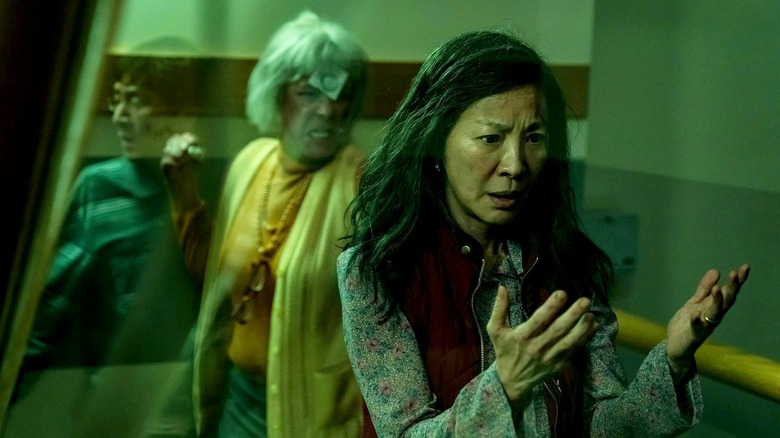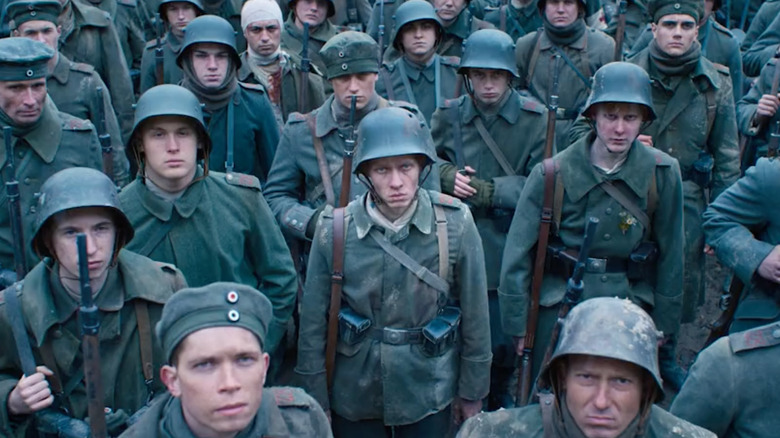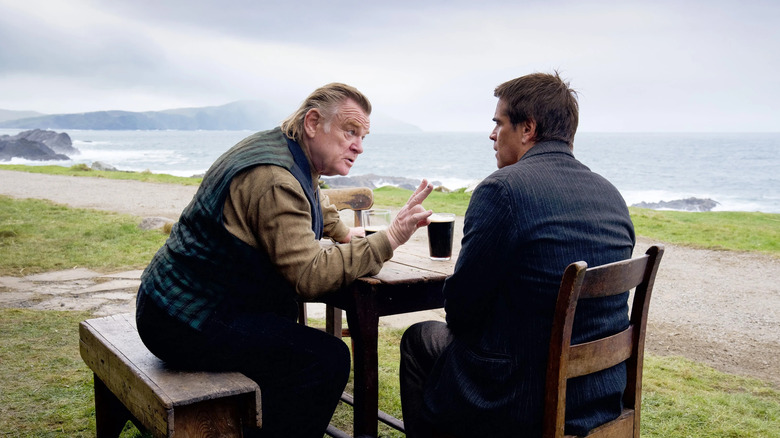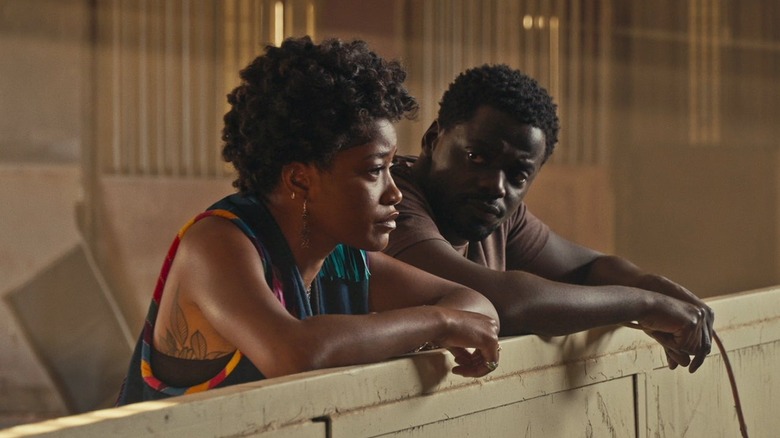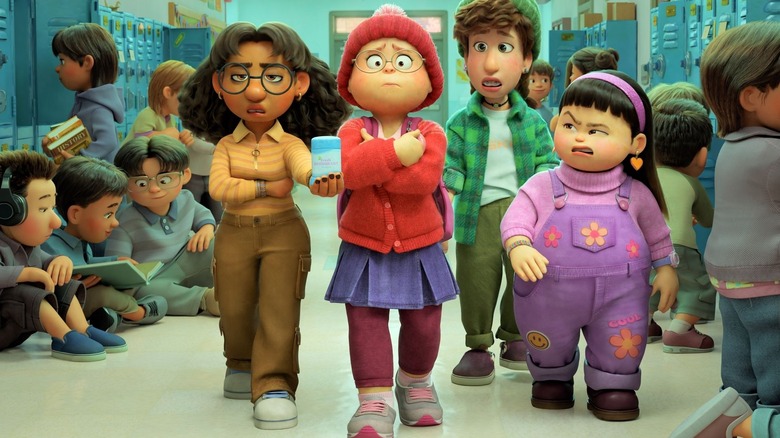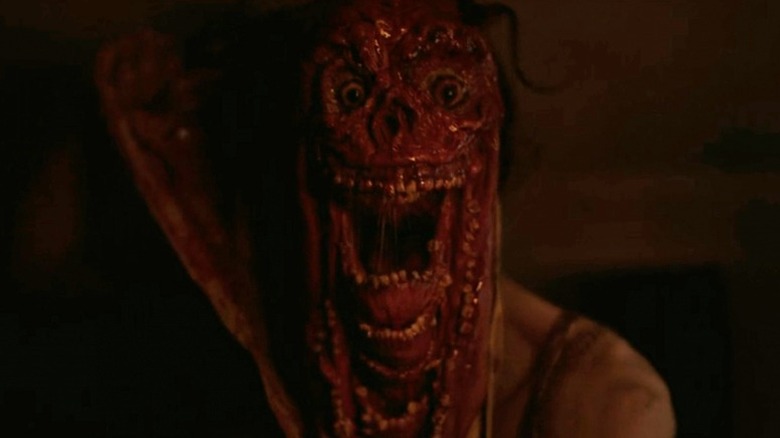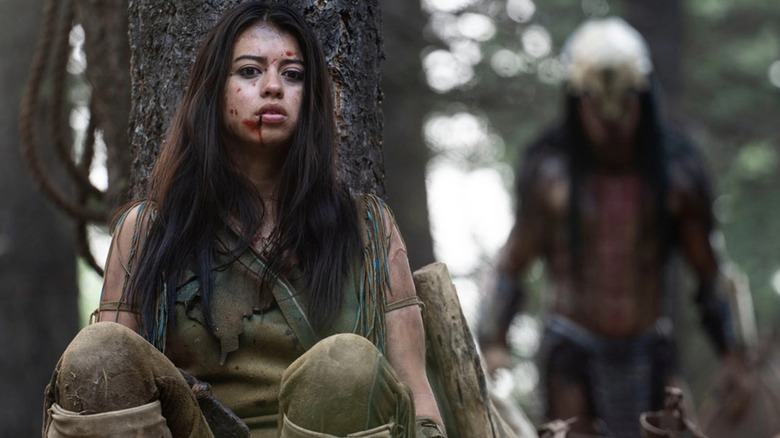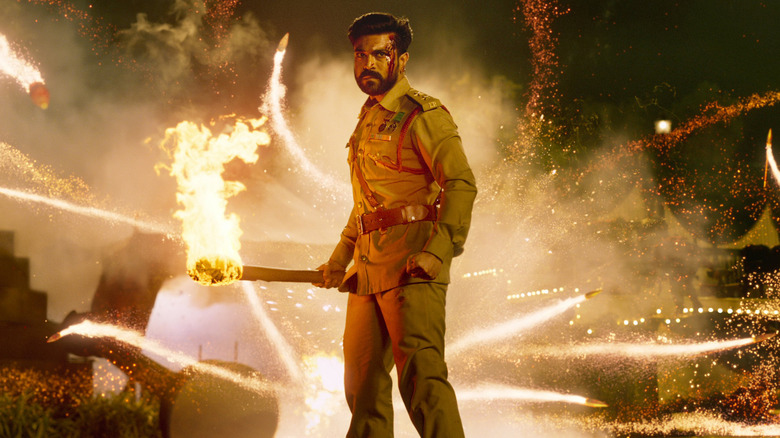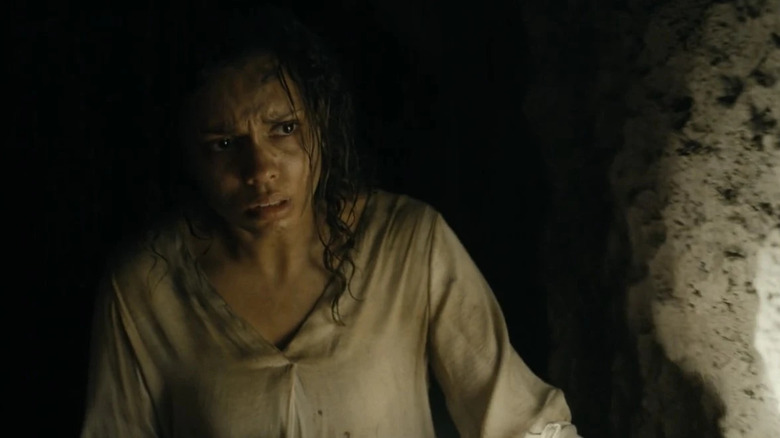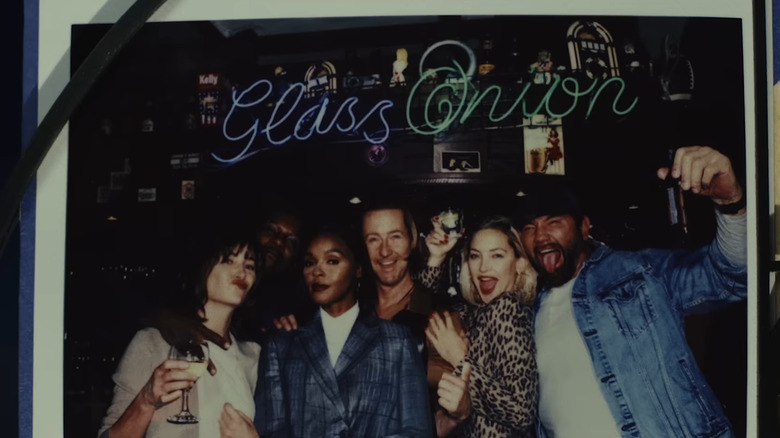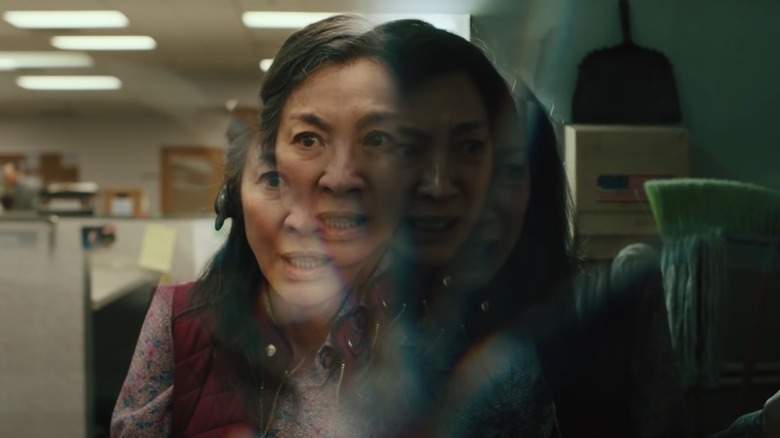Ariel Fisher's Top 10 Films Of 2022
It's the most wonderful time of the year, or so Andy Williams may have you believe. But while everyone was getting ready to spend time with their families, buying presents, and decking various halls with boughs of holly, film critics were scrambling to catch up with all the movies they simply didn't have the time to see yet. Despite the pandemic's impact, this year was full of incredible cinematic selections, and I do mean full! By the end of the year, you're kind of forced to cut your losses and just recognize that no one can see everything ... despite their best efforts.
So while I probably would have included movies like "The Fabelmans" if I'd had the opportunity to safely see them in theaters, what I have seen will certainly pass muster. This year was hard for everyone and brutally so for me personally. Shocking deaths in the family, physical and emotional trauma, and debilitating mental illness were just the tip of the iceberg, which left me eager for both escape and profound empathy. These 10 films are my personal favorites of the year, and in their own way, they all fit the bill and gave me exactly what I needed.
Here are my top 10 films of 2022.
10. All Quiet On The Western Front
The sentiment "now more than ever" has all but completely lost its meaning after the last three years. What better time than now to revisit Erich Maria Remarque's seminal and unflinching 1928 novel about the horrors of war? As interpreted by director Edward Berger and co-writers Berger, Lesley Paterson, and Ian Stokell, "All Quiet on the Western Front" is a bleakly cold and unglamorous adaptation of already brutal source material. Of course, it moved me to tears. It horrified me, and certain moments had me begging and pleading at the screen.
Mind you, these lessons aren't new to me. I've studied them in high school and university from multiple vantage points. I'd like to say we all know that there's no real glory in war, but unfortunately, I think I'd be wrong. Berger's film reminds us of that fact. That despite what we know and what history should have taught us by now, we're circling back to repeat similar heinous mistakes.
The film pulls from a profound narrative and stylistic history of German cinema and the unflinching manner in which the history of war is taught to the country's young, offering some form of context to the unfathomable. Like Helma Sanders-Brahms' semi-autobiographical "Germany, Pale Mother" from 1980 and Marc Rothemund and Fred Breinersdorfer's dramatization "Sophie Scholl: The Final Days," Berger's "All Quiet on the Western Front" forces you to see and feel everything, especially futility and sorrow.
Director of photography James Friend did exceptional work bringing the novel's nightmares to the screen, but the true masterclass comes from Volker Bertelmann's dissonant and haunting score. And while casting German icon Daniel Brühl could have served as a distraction, it instead furthers the point: no amount of glamor or star power can distract from the abject senseless bleakness of war.
9. The Banshees Of Inisherin
I wasn't prepared to be viciously attacked by a movie about a bunch of stubborn white Irishmen on a tiny rural island in the 1920s, but here we are. Martin McDonagh's "The Banshees of Inisherin" is hilarious, tragic, and deeply insightful, and it's almost impossible to go into detail about just why it stands out for me as one of my favorite films of the year. But I'll try to sum it up.
I have been in Pádraic's shoes before, fighting against the wishes of a dear friend out of sheer incredulity. But aside from actually exhibiting some of his truly awful behavior in the past, Pádraic (Colin Farrell) feels like an avatar for my emotional dysregulation and rejection sensitivity. And while I have certainly behaved like Colm (Brendan Gleeson), to me he represents my stubbornness, fear of failure, and pain, all of which are often the birthplace of anger.
Meanwhile, Siobhan (Kerry Condon) is who I think we all simultaneously hope to be and pray we aren't. She's a fiercely intelligent person who cares deeply for others and actually knows better than most but isn't boastful about it. And at the same time, she was raised on self-sacrifice and spent the majority of her life putting herself dead last while managing the lives of the men around her who were too stubborn to do the work themselves. To me, she is the logical part of my brain screaming "are you feckin' dim?!" from the sidelines any time either of the other two pricks takes the wheel.
"The Banshees of Inisherin" dares audiences to take a long hard look at themselves not for the sake of judgment or punishment, but as an exercise in self-awareness. And in that, it succeeds beautifully (and painfully).
8. Nope
After "Get Out," it became a reflex to try and read as much as possible into the subtext of Jordan Peele's filmography, with the common expectation that his movies would say something about contemporary Black culture. And they do, but less so because Peele is actively trying to make a statement and more because he allows Black characters to be the stars of stories that don't actively have to do with Blackness, resulting in a celebration just by existing.
But I'm not here to debate the validity or the place of Peele's work in the canon. I'm saying that "Nope" is one of my favorite films of the year. It takes the most compelling elements of "Jaws" and whips them into a frenzy with a flare that is uniquely Peele's. It takes the spectacle of film history and its legacy and pokes fun at it while holding it in a reverential place at the same time. Quint's (Robert Shaw) U.S.S. Indianapolis monologue is one of the most revered in film history, and it's promptly followed up with a drunken rendition of "Show Me The Way To Go Home" before the grand finale. Peele gives that moment a wink with the largely self-serving debate about whether or not the Haywoods, Angel, and Holst are doing something important, only for Holst to wrap it all up with a very Quint-like rendition of Sheb Wooley's "Purple People Eater."
The movie's about spectacle, and there are infinite layers that we'll hopefully dissect for many years to come. The same was (and remains) true about "Jaws." But at the end of the day, "Jaws" was a creature feature, an exciting, entertaining exploitation flick made with the skill of an auteur. So is "Nope," and it's a hell of a lot of fun.
7. Turning Red
I'm from the GTA. No, not the video game (never heard that one before), but the Greater Toronto Area. Toronto is my home. I have, however, spent the vast majority of the pandemic living far away from home in Michigan. As a result, I am and have been a perpetually homesick wreck. So, naturally, I avoided "Turning Red" like the plague when it first came out. Set in Toronto in the early 2000s, I knew it'd hurt to watch, and couldn't willingly subject myself to that.
Cut to early December, and I finally checked it out. I grinned like an idiot as soon as I saw Meilin's (Rosalie Chiang) period-accurate TTC metro pass and clapped like a seal in my living room. I could smell the street and the spices of Spadina's Chinatown and nearby Kensington Market, and wanted to cry. "Turning Red" is a moving love letter to the city of Toronto and the communities that make it the remarkably diverse mecca that it is (or that it can be, at least, when given the right municipal leadership).
But above and beyond all that, it's the way "Turning Red" addresses the hormonal changes of adolescent girls and the societal stigma around periods that really hit me. For a perfectly healthy person who doesn't have to contend with menstrual issues or mental illness (I have Generalized Anxiety Disorder, ADHD, and PCOS, and menstruation makes life debilitatingly difficult), periods are still a nightmare. Domee Shi's "Turning Red" is a deeply moving testament to that — the debilitating pain, mental fog, and emotional fluctuations, as well as the shame and mockery that accompanies bleeding through a pad or tampon — and the need to break the cycle of oppressive misogyny, both internalized and societal.
6. Smile
There are two things that have always been true about horror as a genre: it's inherently political and it addresses or explores personal, historical, and societal trauma. What's great about "Smile" is that, while some audiences may be a little burnt out with the entire notion of exploring the latter through horror movies, its premise confirms its own relevance and significance.
There's no misconstruing its meaning. "Smile" is literally about trauma and how we deal with it: badly (for the most part). Coping with trauma in any capacity is never linear, something that's especially true for those of us with PTSD or C-PTSD. It does not go away and it's how you cope with it that will determine your quality of life. Sometimes, you don't even get that lucky, and the trauma just swallows you whole despite your best efforts.
Rose Cotter (Sosie Bacon) has worked on her trauma her entire life, even making it her profession, but by the end of the film, that doesn't matter, because while she did the work, it never went away. As someone who lives with C-PTSD, "Smile" was a little too on-the-nose for most of its runtime. I dug it, but it didn't totally grab me ... until I saw the movie's monster in its final form.
When Rose is taken over, she's taken over by trauma itself. It rips off the flesh of its latest victim, and underneath lie the screaming mouths of everyone that came before them. That depiction lingered with me for the rest of the night after I first watched it. I had a full-tilt panic attack and couldn't sleep. It was my greatest fear realized and immortalized on film for all the world to see. "Smile" hit me at my core in a way few movies seldom do. Trauma is immortal and it will outlast us all until there's nothing left. The movie doesn't seem to insist that we're all doomed, but it capitalizes on a fundamental fear in such a way as to confirm that this subgenre, this mode of exploration through film has been here all along, and it isn't going anywhere.
5. Prey
I loved "Predator" growing up. I think a huge part of its appeal stemmed from how it gave me an opportunity to bond with my brother and my dad. It's a very specific and challenging experience growing up with an older brother and craving his and your father's approval while feeling left out by virtue of your gender. And it wasn't deliberate, I was never told I couldn't do things because I was a girl. There was just ... this unspoken thing that left me out a lot of the time.
"Prey" tapped into that for me. It's a wildly entertaining action flick and probably my favorite in the franchise (yes, even more so than the first film). It's the strongest follow-up to the 1987 movie, without question, and that's mostly because it takes things back to what made that first one great: the skill and challenge of the hunt. It got there by telling the story of a young woman who dared to defy her culture's rules, and forged a new path for herself as a great hunter.
Sure, it helps that the kills are absolutely brutal and that it's a genuinely entertaining watch. But Amber Midthunder's performance as Naru is what sets "Prey" apart from other attempts at revisiting the wild and violent fun of the "Predator" series. Dan Trachtenberg's direction and the efforts of the entire production team made a lot of people feel seen and like they belong, but this Comanche-language action movie is so memorable because it's an absolute banger. It really is as simple as that.
4. RRR
I'll be honest, I did not believe the hype when I first heard about "RRR." Everyone — and I do mean everyone — was talking about it, and I just wasn't sold. I didn't get it, but I don't think anyone could blame me, honestly. It's an anti-colonial tome, a fictionalized historical biopic, a war epic, a musical, a buddy comedy, a romantic comedy, a truly bombastic action movie, and about a million other genres and subgenres rolled into one very long film. Mostly, it was just too much for my brain to wrap itself around. Descriptions of it were so overwhelming I just tapped out.
I finally watched it with my husband after it hit Netflix (which unfortunately is not the original Telugu-language cut of the film), and I don't think my jaw left the floor once in the entire three hour and seven minute runtime. I had to move because apparently the edge of my seat was my new home.
It cannot be overstated: "RRR" is one of the best movies of the year. It's audacious, outlandish, and feverishly entertaining in a way that makes its otherwise intimidating runtime fly by. I wanted more of it! After just over three hours! It really is something you just have to see to believe (or understand, really, because the elevator pitch for this movie completely undersells it), and you will like it. "RRR" is probably the most fun I've had watching a movie all year, and for such a difficult and painful year, that counts for a lot!
3. Barbarian
I love this movie so damn much. I was surprised to love something so bleak that deals with such uncomfortable and painful subject matter, but I spent the duration of "Barbarian" laughing, smiling, doing my best Leo Pointing impression, and screaming to no one but myself about how brilliant it is. As is often the case, the less you know about "Barbarian" going into it, the better its impact. That said, spoilers ahead.
From the very beginning, Tess (Georgina Campbell) is on high alert because she has to be. "The world's different for you," she tells Keith (Bill Skarsgård) over a glass of wine. "Guys get to blast their way through life making messes. Girls have to be careful."
"Barbarian" is about men's messes at the expense of women, and the women who have to clean up after them in order to survive, sometimes literally. This sentiment is true for pretty much all women, but it's especially true for Black women and women of color who have to navigate the woefully biased societal parameters of race as well as gender. Keith, AJ (Justin Long), and Frank (Richard Brake) are different levels of the same problem wherein men can move through the world with nary a care in the world, and women have to have their guard up constantly as a result.
Writer-director Zach Cregger made something so outstanding with "Barbarian," and my hope is that it's dissected and praised for many, many years to come. Like 476 Barbary itself, "Barbarian" has deep layers that should absolutely be exposed and explored.
2. Glass Onion: A Knives Out Mystery
While the "Knives Out Mysteries" (as they'll heretofore be known) actively owe their very existence to those that came before — Agatha Christie, "Columbo," and "Murder She Wrote" to name a few — Rian Johnson has solidified a new era for the genre with "Glass Onion." The reverential sequel is, as /Film's Chris Evangelista so aptly put it, "an even bigger, funnier, twistier whodunnit," that canonizes Daniel Craig's Benoit Blanc as one of the great sleuths perhaps of all time. A bold statement, but I'm sticking to it.
What makes "Glass Onion" so outstanding isn't just its modernized Hercule Poirot avatar, but rather its welcomed scrutiny of white supremacy, fragility, and mediocrity. When faced with the prospect of being rendered obsolete, irrelevant, or powerless, every single member of CEBro Miles Bron's (Edward Norton) entourage fall in line in order to keep their seat at his ostentatious table. And all of this is at the expense of Andi Brand (Janelle Monáe), the one person who ever told him "no."
The dude unironically mimics Tom Cruise's costume from "Magnolia" to go to the pub with his friends, glorifies the "Mona Lisa" for all the wrong reasons (as most painfully mediocre white men tend to), and so much more than I have the space to fit here. And all the while, Birdie Jay (Kate Hudson), Duke Cody (Dave Bautista), Lionel Toussaint (Leslie Odom Jr.), and Claire Debella (Kathryn Hahn) help him uphold the status quo because he shields them from accountability while simultaneously using them as scapegoats.
That Janelle Monáe's Helen is forced to save the day by giving the complacent bunch the confidence to stand up to this otherwise underwhelming man screams volumes. There's so much to unpack here, and extravagance is just the tip of the privileged iceberg.
1. Everything Everywhere All At Once
If I could have, this entire list would've just been Daniels' "Everything Everywhere All At Once" over and over and over again. This movie is about generational trauma, as Daniels Kwan and Scheinert have said on many occasions, but it's also about both limited and limitless potential, disappointment, breaking cycles of familial abuse, and, my absolute favorite, having ADHD.
While writing "EEAAO," Kwan was diagnosed with ADHD. It was an incidental but happy side effect of working on the film to begin with, a project where Daniels wanted to explore what it might be like if you really could be or do everything, everywhere, all at once, which is funnily enough what the ADHD mind can feel like. Having ADHD is simultaneously liberating and debilitating, equal parts limiting and invigorating, but in a neurotypical society that favors working, living, and existing in a neurotypical way, it can be excruciatingly painful and lonely. I was diagnosed with ADHD in my 30s and had only ever seen the stereotypical depictions of the disorder in the media. Distracted by shiny things, disruptive, lazy, loud, dumb, useless, and exclusively male.
Watching "Everything Everywhere All At Once" felt like the first day I took Adderall: euphoric and transformative. All of a sudden, everything made sense. That day, my mind was quiet for the first time in over 32 years. My dog's fur felt softer because I could focus on the sensation. I deliberately sat in silence for hours simply because I could. I essentially had to re-learn how to process emotions because everything was so overwhelming, I felt like I was meeting myself for the first time. Like Evelyn (Michelle Yeoh) learning skills from different parts of the multiverse, it was like I was learning to feel again, and meeting myself for the first time in my life.
What Daniels have done with "EEAAO" is nothing short of incredible, because they managed to portray the internal experience and sensation of ADHD on the screen. This movie will forever be one of the most formative of my adult life as a result.
